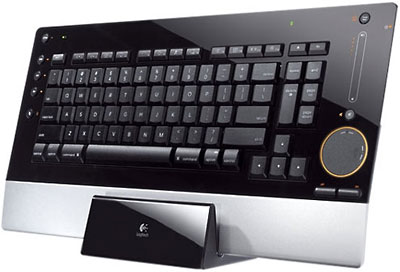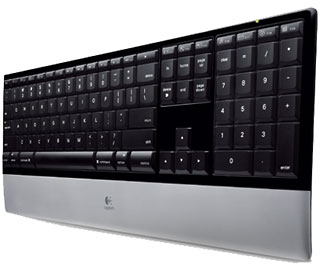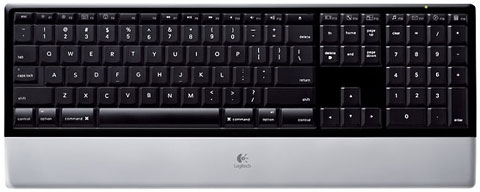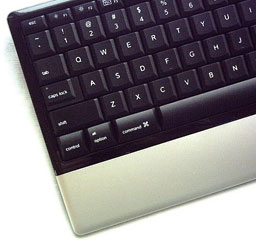Even though I'm a consummate laptop computer fan, I prefer to use an
external keyboard and mouse whenever practical. The body-English
associated with using a laptop's built-in keyboard and trackpad while
cranking your head downward to see the display is terrible, and the
ergonomic hazards of doing so for more than short periods of time are
well established and documented.
Accordingly, anyone who uses a notebook computer as their main work
tool should have a good external keyboard and pointing device - and get
that display up into the comfortable line of vision using a laptop
stand. Aside from Apple's own freestanding keyboards and mice, a vast
selection of third-party input devices are available, and Swiss-based
Logitech makes some of the best, backed by a five-year warranty.
Now here's the thing. I really liked the Logitech
diNovo Edge Mac Edition Cordless Keyboard that I reviewed here back in
2008, and which I think may well be the most aesthetically elegant
keyboard ever made, with its glossy piano black surfaces and brushed
aluminum accents. Being rechargeable is also cool, eliminating the
hassle of messing about with batteries.

Logitech diNovo Edge Keyboard, Mac edition.
diNovo Edge Drawbacks
The Edge is a Bluetooth wireless 'board, which means that you have
to muck about with Bluetooth pairing to get it set up.
For my purposes, the diNovo Edge's lack of a numeric keypad and its
dispensing with the F13 through F15 keys was not compensated for by its
inclusion of a built-in TouchDisc trackpad, touch-sensitive volume
control, or any of the other multimedia controls and features it
incorporates. I'm used to getting along without a numeric keypad and a
full array of F-keys on my laptops, but I much prefer to have both,
especially on a workstation keyboard. I especially miss the right-hand
number keys when switching between OS X 10.5 Leopard Spaces, of which I keep nine
configured, constantly switching among them, which requires a reach to
the top of the key array with the diNovo Edge.
diNovo Keyboard, Mac Edition

Happily, Logitech addressed that preference (or necessity, for some
folks who work with spreadsheets) by introducing the diNovo
Keyboard, Mac Edition, which retains many of the virtues of the
more expensive diNovo Edge - its high-gloss, semi-translucent Plexiglas
frame, sharp angles, and thin profile (0.87" or 22.1 mm from base to
key caps) - but with a standard keyboard layout and full numeric keypad
and sans the touchpad and multimedia stuff.
Well, near standard. The page keys are in a cluster at the
top of the intermediate panel separating the main keyboard from the
numeric pad, and there are a bonus 19 programmable F-Keys - something I
don't recall ever seeing on another keyboard, plus (hooray!) a
dedicated Eject key. I am a big fan of F-keys.

The DiNovo Keyboard is wireless, but it uses the 2.4 GHz radio
frequency, which I prefer over Bluetooth despite the fact that it
requires a USB receiver dongle, which in this instance happens to be a
longish one that protrudes about an inch-and-a-half from the USB
port.
The cool thing is that Logitech managed to pack in a full complement
(and then some) of standard-size keys in a board with a footprint
barely wider and less deep than the diNovo Edge, while retaining the
classy and Mac-complimentary piano black and brushed aluminum livery.
This keyboard will make an excellent choice for use with one of the
Unibody MacBooks on a desktop stand or with aluminum iMacs, since the
black and brushed aluminum theme harmonizes especially nicely with
those models. The diNovo Keyboard is also compact enough to pack what
you in a medium-to-large sized computer case or backpack for use on the
road.
Another feature shared with the diNovo Edge is the
PerfectStroke microscissors key switches, which are engineered to have
a short, positive action with a slightly longer stroke than your
typical laptop keyboard. Specifically, the PerfectStroke keys require
60 grams activation force and have a travel of 3.2mm (shorter than a
typical desktop keyboard's 3.5mm to 4.0mm, but longer than your typical
notebooks' - or Apple's aluminum 'boards - 2.0mm to 2.5mm).
Almost Completely Standard Mac Layout
 Of course, this Mac edition keyboard has standard Apple
specific key labeling and positioning, with ambidextrous Command,
Option, and Control keys located on the row flanking the Space Bar. The
the navigation keys are in the ideal inverted-T configuration, with the
only real anomaly (as noted) being the page keys' positioning to the
upper right of the main keyboard array along with an fn key, where you
might expect to find the Forward Delete key, and the Forward Delete key
immediately beside it. Odd decision, but in general it's a mild
departure from a standard layout that one gets used to quickly.
Of course, this Mac edition keyboard has standard Apple
specific key labeling and positioning, with ambidextrous Command,
Option, and Control keys located on the row flanking the Space Bar. The
the navigation keys are in the ideal inverted-T configuration, with the
only real anomaly (as noted) being the page keys' positioning to the
upper right of the main keyboard array along with an fn key, where you
might expect to find the Forward Delete key, and the Forward Delete key
immediately beside it. Odd decision, but in general it's a mild
departure from a standard layout that one gets used to quickly.
There is no Power key to power up the system, but there is an on/off
power switch for the keyboard itself located on the back edge of the
housing and a small, green power indicator LED.
Basic keyboard functions are supported by OS X without the Logitech
Control Center drivers installed, but if you want to get the full
functionality this 'board is capable of, such as programming the
F-keys, you'll need to install the drivers, which are included on a
bundled CD. Installation requires a restart of the Mac.
The diNovo Keyboard is powered by four AAA cells, which
Logitech claims offer battery life of up to three years (based on two
million keystrokes per year). A flashing battery indicator light warns
when battery resources are running low.
 In profile, the diNovo keyboard isn't quite as razor-thin
as Apple's aluminum keyboard, but it's definitely low-profile. It has a
bit of rake compared with the diNovo Edge's flat orientation. At a list
price of $99.99, the diNovo Keyboard for Mac Edition is more expensive
than Apple's aluminum keyboards, but substantially less so than the
diNovo Edge's $179.99.
In profile, the diNovo keyboard isn't quite as razor-thin
as Apple's aluminum keyboard, but it's definitely low-profile. It has a
bit of rake compared with the diNovo Edge's flat orientation. At a list
price of $99.99, the diNovo Keyboard for Mac Edition is more expensive
than Apple's aluminum keyboards, but substantially less so than the
diNovo Edge's $179.99.
The diNovo Keyboard Mac Edition is a deluxe keyboard alternative
with excellent quality of workmanship, materials, finish, and
thoughtful design. If those qualities are important to you, you'll
probably find it worth the premium price.
Product Specifications
- Dimensions (L x W x H): 17.01 x 6.82 x 0.88 inches
- Weight:
- 1.63 pounds without batteries
- 1.98 pounds with 4 AAA batteries
Warranty: • 5-year limited hardware
System requirements:
- Mac computer with Mac OS X (10.3.9 or later)
- 1 USB port
- CD-ROM drive
- The diNovo Keyboard, Mac Edition can be used with any Mac computer,
including the MacBook Air, iMac, MacBook, or MacBook Pro.
Unfortunately, it appears that the Mac versions of these diNovo
keyboards are no longer being manufactured by Logitech (the
diNovo Edge for Windows continues in production), although they're
still supported and still advertised by many resellers, usually at
discounted prices. If you want one for your Mac, best move quickly.
Purchase Links




 Of course, this Mac edition keyboard has standard Apple
specific key labeling and positioning, with ambidextrous Command,
Option, and Control keys located on the row flanking the Space Bar. The
the navigation keys are in the ideal inverted-T configuration, with the
only real anomaly (as noted) being the page keys' positioning to the
upper right of the main keyboard array along with an fn key, where you
might expect to find the Forward Delete key, and the Forward Delete key
immediately beside it. Odd decision, but in general it's a mild
departure from a standard layout that one gets used to quickly.
Of course, this Mac edition keyboard has standard Apple
specific key labeling and positioning, with ambidextrous Command,
Option, and Control keys located on the row flanking the Space Bar. The
the navigation keys are in the ideal inverted-T configuration, with the
only real anomaly (as noted) being the page keys' positioning to the
upper right of the main keyboard array along with an fn key, where you
might expect to find the Forward Delete key, and the Forward Delete key
immediately beside it. Odd decision, but in general it's a mild
departure from a standard layout that one gets used to quickly.
